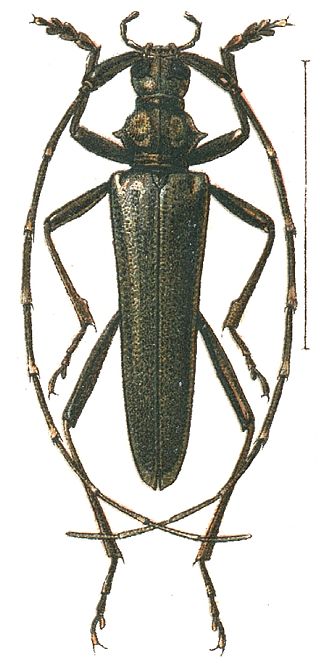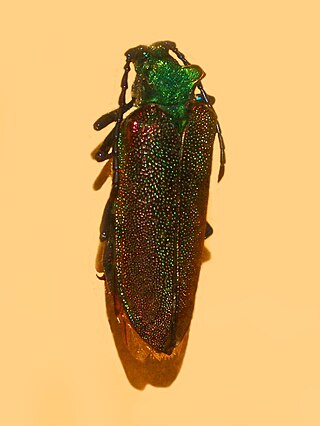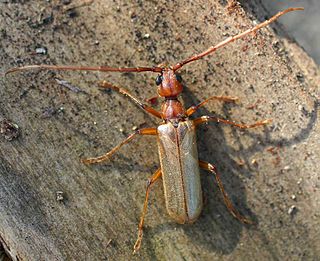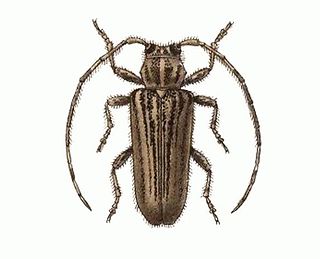
The longhorn beetles (Cerambycidae), also known as long-horned or longicorns, are a large family of beetles, with over 35,000 species described.

The Chrysomeloidea are an enormous superfamily of beetles, with tens of thousands of species. The largest families are Cerambycidae, long-horned beetles, with more than 35,000 species, and Chrysomelidae, leaf beetles, with more than 13,000 species.

Per Olof Christopher Aurivillius was a Swedish entomologist.

Lamiinae, commonly called flat-faced longhorns, are a subfamily of the longhorn beetle family (Cerambycidae). The subfamily includes over 750 genera, rivaled in diversity within the family only by the subfamily Cerambycinae.

The Disteniidae are a small family of beetles in the superfamily Chrysomeloidea, traditionally treated as a group within the Cerambycidae.

The Oxypeltidae are a small family belonging to the superfamily Chrysomeloidea, widespread in the Andean region of Chile and Argentina. They have traditionally been considered a group within the Cerambycidae.

The Vesperidae are a small family of beetles, normally classified within the family Cerambycidae, of heterogeneous aspect but all characterised by larval stages related to roots of herbaceous plants or trees

Cerambycinae is a subfamily of the longhorn beetle family (Cerambycidae). The subfamily has a world-wide distribution including: Asia, Europe and the Americas. Within the family, the only subfamily of comparable diversity is the Lamiinae.

Lepturinae, the lepturine beetles, is a subfamily of the longhorn beetle family (Cerambycidae), containing about 150 genera worldwide. This lineage is most diverse in the Northern Hemisphere. Until recently the subfamily Necydalinae was included within the lepturines, but this has been recently recognized as a separate subfamily. Nine tribes are usually recognized today, with a tenth, Caraphiini, created in 2016. A few genera are of uncertain placement within the subfamily.

Stephan von Breuning was an Austrian entomologist who specialised in the study of beetles (coleopterology), particularly within the longhorn family (Cerambycidae).

Dorcasominae is a subfamily in the longhorn beetle family Cerambycidae. There are about 14 genera and more than 30 described species in Dorcasominae, found mainly in Asia and Africa. These genera are sometimes considered members of the tribe Dorcasomini, which would be the only tribe of this subfamily. This classification is in accordance with the TITAN Cerambycidae database, Catalogue of Life, and Photographic Catalog of the Cerambycidae of the Old World. It is similar to that of Bouchard et al. in "Family-group names in Coleoptera", 2011.

Callidiini is a tribe of longhorn beetles in the family Cerambycidae. There are more than 30 genera and 180 described species in Callidiini.

Trachyderini is a tribe of long-horned beetles in the family Cerambycidae. There are at least 140 genera and 650 described species in Trachyderini.
Lepturgantes is a genus of beetles in the family Cerambycidae. The genus is placed in subfamily Lamiinae and tribe Acanthocinini.
Estola benjamini is a species of beetle in the family Cerambycidae. It was described by Stephan von Breuning in 1940. It is known from Colombia.
Estola brunnescens is a species of beetle in the family Cerambycidae. It was described by Stephan von Breuning in 1940. It is known from Colombia and Venezuela.
Estola nigropunctata is a species of beetle in the family Cerambycidae. It was described by Stephan von Breuning in 1940. It is known from Brazil.
Estola freyi is a species of beetle in the family Cerambycidae. It was described by Stephan von Breuning in 1955. It is known from Trinidad.

Estola vittulata is a species of beetle in the family Cerambycidae. It was described by Henry Walter Bates in 1874. It is known from Panama, Mexico and Venezuela.













